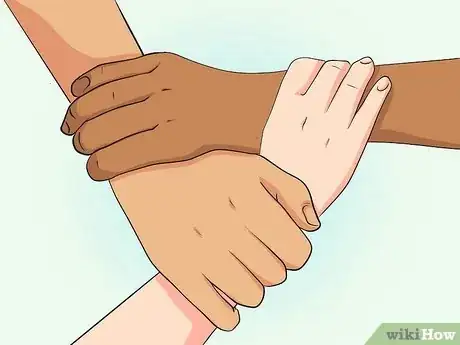X
wikiHow is a “wiki,” similar to Wikipedia, which means that many of our articles are co-written by multiple authors. To create this article, volunteer authors worked to edit and improve it over time.
This article has been viewed 31,077 times.
Learn more...
Vulnerability is often viewed as weakness, a form of being easily swayed, overcome by or subject to the emotions, feelings and expectations of others. However, it's also a sign that you're emotionally connected, empathetic and caring. Wanting to appear less vulnerable should be undertaken with care so you don't end up shutting down. In this article, we'll show you several positive ways you can do to appear and feel less vulnerable.
Steps
Part 1
Part 1 of 4:
Who is trying to shape you?
-
1Observe how many masters you have in your life. People who tell you what to do must have a legitimate reason for this role. That means, your boss asking you to perform work, your parents asking you to do something when you're under 18, or your local police officer asking you to stop jaywalking. This does not mean your spouse nagging you, your adult parents insisting you become the realization of their failed dreams or your co-worker insisting that you complete their deadlines as well as your own. Too many masters in your life telling what to do can end up causing internal conflict, unhappiness and confusion.
-
2Listen but don't change for every person who insists they know what's best for you. While it's okay to listen to other people's advice, it's not okay to be led by their preferences on who you should be according to their grand plan. Have your own grand plan and balance the advice you receive to help, not hinder you.
Advertisement
Part 2
Part 2 of 4:
Shaping yourself
-
1Consider what matters to you in life. If you are a caring, sharing and emotionally connected person, don't give that up for the sake of wanting to appear tougher. You are who you are, and this journey is partly about getting others to respect that.
-
2Think about ways in which you might contribute to your own vulnerabilities. If you have a life plan but you are inconsistent, vague and easily persuaded to follow other directions, this can be harmful to developing your true self. This isn't the same as openness to new experiences and willingness to try new things––such virtues can be practiced without losing a sense of self. The problem arises when you let others decide your destiny, your direction and what sorts of values you should follow. Chopping and changing your mind can lead to being vulnerable to other people's opinions.
-
3Develop your own values and be happy that they truly represent you. Then, be consistent about them and follow through on these values, enhancing your skills, talents and thoughts in line with these values.
Advertisement
Part 3
Part 3 of 4:
Finding strength in vulnerability
-
1Don't apologize for being emotional, sensitive or tender. If you are someone who cares so much that your heart is on your sleeve, wear it with pride. There aren't enough people willing to stand up for feelings and emotions forming a valid part of the whole. Remind yourself that showing emotions is a sign of strength.
- Brené Brown, author of Daring Greatly, says that vulnerability is "the birthplace of innovation, creativity and change." She also says it represents truth and courage. These are brilliant virtues, not weaknesses to be hidden away!
-
2Practice self validation. This isn't about patting yourself on the back just for being awesome all the time. It's about recognizing when you've done a good job, helped someone, made a positive difference and tried hard. This ability to self coach and self validate will help you to overcome the need for validation from others, which can become an obsessive pursuit that leaves you vulnerable to others' judgments, which are frequently misplaced or self-interested.
- Be ready to acknowledge to yourself when you've done a good job, when you need to improve and when things that didn't go so well aren't the end of the world but a pathway to making things right again. This makes for a nice balance that is not narcissistic, unrealistic or pessimistic.
-
3Find your own pathway to contentment. A content person is someone who has put right whatever is wrong in life. Contentedness comes from more than simply pursuing what other people say produces happiness––it comes from working out for yourself what brings you contentment and fulfillment. Some of this will take trial and error, and it will change over time. But that's okay, a person who is flexible won't break when bent by life's inevitable hardships.
Advertisement
Part 4
Part 4 of 4:
Appearing strong
-
1Be the best you can be. This means knowing your strengths and building on them, realizing that talent is only part of the equation and that honing it through learning, practice and more practice, is the best way to improve throughout life. It also includes knowing that you can do things competently.
-
2Respect yourself and respect others. Both forms of respect lead to respect being returned to you. Respect is a form of scuttling any appearance of vulnerability because people know you're strong.
Advertisement
About This Article
Advertisement




































































